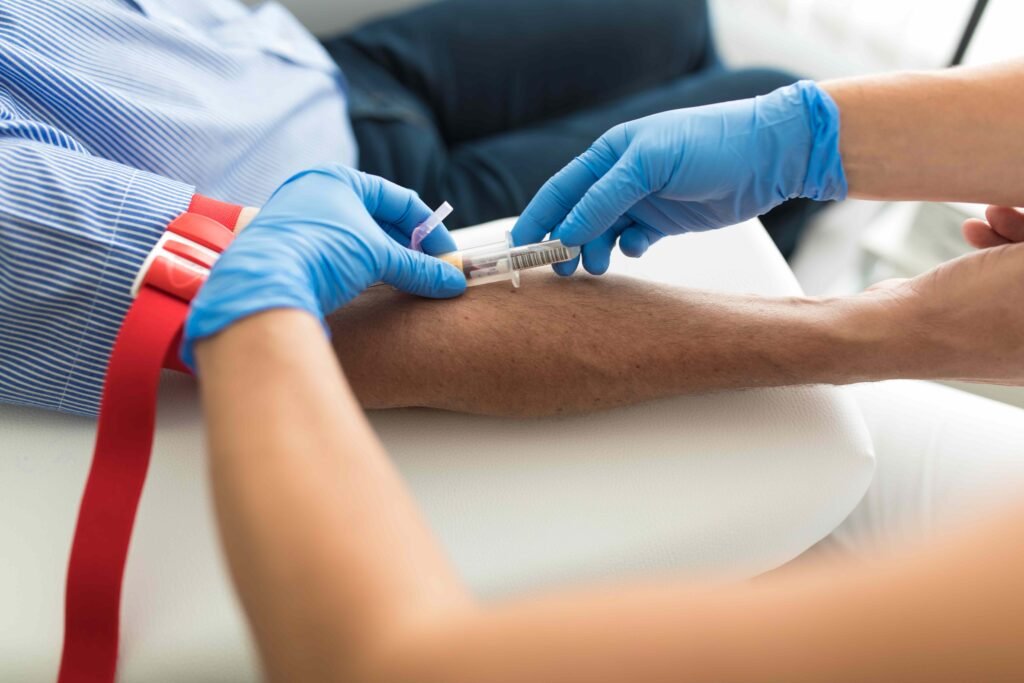A PSA test measures the level of prostate-specific antigen (PSA), a protein that your prostate gland produces, in a sample of your blood. PSA levels can increase due to prostate cancer or other prostate-related conditions, like an enlarged prostate or prostate infection.
Prostate cancer is the second leading cause of cancer-related deaths among men globally. A healthcare provider may recommend a PSA test to screen for or monitor prostate cancer in people who have a higher risk of prostate cancer.
You may be at a higher risk of prostate cancer based on your:
- Age: The risk increases after age 50.
- Family history: Your risk is higher if a relative has had prostate cancer.
- Race: Black men have a higher risk of prostate cancer, including at a younger age.
Your provider may also recommend the test if you have symptoms such as:
- Painful urination
- Frequent urination
- Blood in your urine or semen
- Loss of bladder control
- Pain in your lower back
You may need to prepare for the test in a few ways. Your healthcare provider may recommend avoiding certain things that could interfere with your test results by changing your prostate-specific antigen levels.
Things to avoid for 24-48 hours may include:
- Sexual activities, including masturbation
- Vigorous exercises such as cycling
- Certain medications
Some medications, such as Propecia (finasteride) or Avodart (dutasteride), can lower your PSA levels. Talk to your doctor about whether you should stop taking these or any other medications before your test. Do not stop taking medications without your doctor’s guidance.
Wear comfortable, loose-fitting clothes to the test so that you can easily expose your arm for blood drawing. Consider bringing a family member or friend to the test, especially if blood tests make you anxious.
If you have health insurance, consider talking to your insurance provider to understand whether they will cover the cost of the test.
The PSA test involves drawing a sample of blood from a vein in your arm. The process usually takes less than five minutes.
During the Test
Your doctor or a phlebotomist (a specialist in drawing blood) may ask you to sit or lie down comfortably. Then, the blood drawing process involves these steps:
- The healthcare provider cleans the area with an antiseptic (germ-killing) solution.
- They put an elastic band on your upper arm to help your vein swell with blood.
- They insert a needle into a vein to collect blood in an airtight vial or tube attached to the needle.
- They remove the needle and band from your arm, then apply a cotton pad or bandage to the needle site.
After the Test
You can typically resume your daily activities immediately after the test. Consider asking someone to take you home if you tend to feel dizzy or weak after blood draws.
A PSA test is very safe. You may feel slight and temporary pain or bruising at the needle site.
Rarely, some people have complications, including:
- Excessive bleeding at the needle site
- Infection at the needle site
- Nerve damage
- Pain at the needle site
Your results may be available within about a day of the test. Many labs now have an online portal where you can check your results. Labs can also send the results directly to your doctor. You can call or visit your doctor to discuss the results and any next steps.
Interpreting Your Results
PSA levels are measured in units called nanograms per milliliter (ng/mL). In general, a PSA level above 4.0 is considered higher than normal. PSA levels may increase with age, though, so doctors may use a higher cutoff level if you’re older and a lower cutoff if you’re younger.
A higher-than-normal PSA level may suggest prostate cancer or other prostate conditions, but it’s not enough to make a diagnosis. Your provider may recommend another test in six to eight weeks to confirm the original finding, especially if you don’t have symptoms.
After that, they may recommend additional tests to help lead to a diagnosis, such as:
- Digital rectal exam (DRE): Your provider may physically check your prostate by inserting a gloved, lubricated finger into your rectum.
- Urine tests: A sample of your urine may show signs of infection that could explain the elevated PSA levels.
- Prostate biopsy: Your doctor may collect small tissue samples from your prostate gland and look at them under a microscope for cancer cells. This minor surgery is the only way to diagnose prostate cancer.
- Magnetic resonance imaging (MRI): An MRI helps provide detailed images of your prostate and can show lumps or other abnormalities.
A PSA test measures the level of prostate-specific antigen (PSA) in your blood. Higher-than-normal PSA levels may suggest prostate cancer, prompting your doctor to do further testing. Testing may include a prostate biopsy, a minor surgery that can help diagnose prostate cancer.

